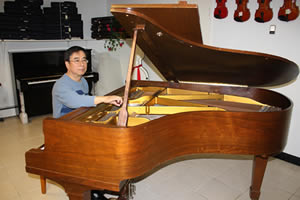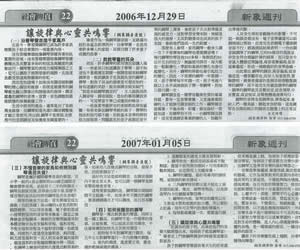PIANO TUNING
MAINTENANCE
PIANO TEACHING
VOCAL TEACHING
OUR SERVICES
All of our new and rebuilt pianos come with:
* Five to ten year limited warranty
* Free tuning
* Free matching bench
* Free delivery (*additional moving fee may apply)
PIANO KNOWLEDGE

 Tuning:
Tuning:
Most pianos should be tuned once or twice a year depends on how frequent the piano is played. Pianos that are used for performance or for recording will need to be tuned more often. (3-4 times a year)
Piano & Temperature:
Pianos can be damaged by extreme heat as well as by extreme cold. Ideally, a piano is kept in a room in which the temperature is normal and constant (around 68 F). The temperature should not be allowed to fall below 45 F and should not exceed 90 F.
Piano & Humidity:
Extremes of humidity as well as large changes in humidity are both harmful to pianos. Ideally, a piano will be maintained in a room in which the relative humidity remains constant year-round. In a dry climate such as is found in the U.S. Southwest, a relative humidity in the 20% to 30% range is a good objective. In a varied climate such as is found in the U.S. Northeast, the relative humidity should be kept in the 35% to 45% range. In a tropical climate, the relative humidity should be kept between 45% and 55%. Room humidifiers should be used whenever possible in those parts of the world in which there are cold, dry winters. Dehumidifiers are essential in tropical climates. Air conditioners can also be helpful - especially if they run fairly constantly. A Dampp-Chaser unit that is properly installed helps maintain constant humidity in a piano year round (but cannot fully correct situations that are extreme).
Piano & Sunlight:
Direct sunlight harms a piano's finish (causing it to bleach and to crack). The heat caused by direct sunlight destabilizes the piano interior. A piano should never be placed in a spot where there is direct sunlight. If it must be placed in such a spot, a window shade and/or a piano cover are essential.
Piano Interior:
Keep fluids away from the piano. Juice, soda, even water spilled into a piano can do severe damage. Never touch the bass strings. Residue from hands and fingers causes corrosion, which can cause the bass strings to buzz and to lose clarity and power. Remove dust with a leaf blower or with the exhaust from a vacuum cleaner. If you live in a city, grime may accumulate over the years. Only a specialist should clean this.
Piano Keys:
The fallboard should always be open to allow free circulation of air around the keys. Keys should be cleaned only with a soft cloth, dampened very slightly with water or club soda (or Windex if the keys are really dirty). Never put fluid directly on the keys.
Piano Furniture:
The case should be dusted with a lambs-wool duster (available in many hardware stores). To remove smudges, use soft clean cheesecloth or old clean cotton tee shirt (with the seams removed). Spray a small amount of water (or Windex if necessary) onto the cloth and then rub the smudged area in the direction of the grain. Do not rub across the grain and do not apply fluid directly to the piano. Avoid using the piano lid as a display surface. In particular, never place a vase containing water or wet soil on the piano. Furniture polish should never be used on a new finish.
All of our new and rebuilt pianos come with:
* Five to ten year limited warranty
* Free tuning
* Free matching bench
* Free delivery (*additional moving fee may apply)
PIANO KNOWLEDGE

 Tuning:
Tuning:Most pianos should be tuned once or twice a year depends on how frequent the piano is played. Pianos that are used for performance or for recording will need to be tuned more often. (3-4 times a year)
Piano & Temperature:
Pianos can be damaged by extreme heat as well as by extreme cold. Ideally, a piano is kept in a room in which the temperature is normal and constant (around 68 F). The temperature should not be allowed to fall below 45 F and should not exceed 90 F.
Piano & Humidity:
Extremes of humidity as well as large changes in humidity are both harmful to pianos. Ideally, a piano will be maintained in a room in which the relative humidity remains constant year-round. In a dry climate such as is found in the U.S. Southwest, a relative humidity in the 20% to 30% range is a good objective. In a varied climate such as is found in the U.S. Northeast, the relative humidity should be kept in the 35% to 45% range. In a tropical climate, the relative humidity should be kept between 45% and 55%. Room humidifiers should be used whenever possible in those parts of the world in which there are cold, dry winters. Dehumidifiers are essential in tropical climates. Air conditioners can also be helpful - especially if they run fairly constantly. A Dampp-Chaser unit that is properly installed helps maintain constant humidity in a piano year round (but cannot fully correct situations that are extreme).
Piano & Sunlight:
Direct sunlight harms a piano's finish (causing it to bleach and to crack). The heat caused by direct sunlight destabilizes the piano interior. A piano should never be placed in a spot where there is direct sunlight. If it must be placed in such a spot, a window shade and/or a piano cover are essential.
Piano Interior:
Keep fluids away from the piano. Juice, soda, even water spilled into a piano can do severe damage. Never touch the bass strings. Residue from hands and fingers causes corrosion, which can cause the bass strings to buzz and to lose clarity and power. Remove dust with a leaf blower or with the exhaust from a vacuum cleaner. If you live in a city, grime may accumulate over the years. Only a specialist should clean this.
Piano Keys:
The fallboard should always be open to allow free circulation of air around the keys. Keys should be cleaned only with a soft cloth, dampened very slightly with water or club soda (or Windex if the keys are really dirty). Never put fluid directly on the keys.
Piano Furniture:
The case should be dusted with a lambs-wool duster (available in many hardware stores). To remove smudges, use soft clean cheesecloth or old clean cotton tee shirt (with the seams removed). Spray a small amount of water (or Windex if necessary) onto the cloth and then rub the smudged area in the direction of the grain. Do not rub across the grain and do not apply fluid directly to the piano. Avoid using the piano lid as a display surface. In particular, never place a vase containing water or wet soil on the piano. Furniture polish should never be used on a new finish.



